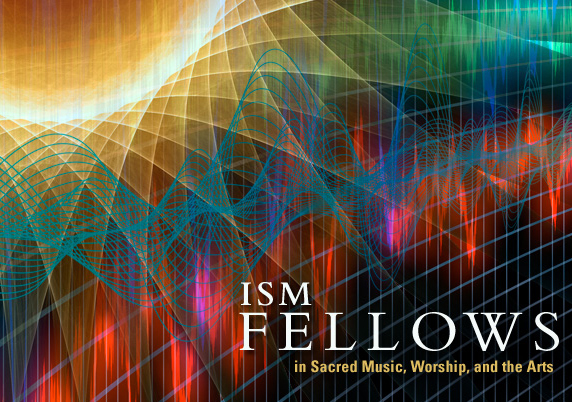The Yale Institute of Sacred Music (ISM) is pleased to announce that eight fellows will be joining its interdisciplinary community for the 2015-2016 year.
The Institute is an interdisciplinary graduate center educating leaders who foster, explore, and study engagement with the sacred through music, worship, and the arts in Christian communities, diverse religious traditions, and public life. With a core focus on Christian sacred music, the ISM builds bridges among disciplines and vocations and makes creative space for scholarship, performance, and practice.
ISM Senior Fellows in Sacred Music, Worship, and the Arts are established scholars, religious leaders, or artists whose work is in or is turning toward the fields of sacred music, liturgical/ritual studies, or religion and the arts. The ISM also accepts Postdoctoral Fellows at the beginning of their career. The Fellows have numerous opportunities to share their work with the community and to teach, as well as to work on their individual projects using Yale’s vast resources. Following in the footsteps of previous cohorts of ISM fellows, the 2015-2016 fellows represent a cross-section of cultures and disciplines.
Andrew Albin is assistant professor of English literature at Fordham University. Specializing in late medieval English literature and culture, he is at work on a project under contract for publication at the Pontifical Institute of Mediaeval Studies in 2017, Richard Rolle’s “Melody of Love”: Alliterative Translation and Commentary. This book is the first English translation of the medieval Latin mystical treatise and will include complete critical commentary, marginalia transcription, and scores and musical recording of associated fifteenth-century English devotional music.
Musicologist and composer Michael Dodds is associate professor of music history at the University of North Carolina School of the Arts, and director of music at the First Presbyterian Church of Winston-Salem. His project, From Modes to Keys: The Organ in Baroque Liturgy, investigates one of the broadest and most elusive questions still unanswered in music history: the nature of the transition from the Renaissance modes to the major-minor tonal system. The book will be published by Oxford University Press.
Meredith Gamer received her Ph.D. in the history of art from Yale in 2015. Her project, “The Sheriff’s Picture Frame”: Art and Execution in Eighteenth-Century Britain, will build on her dissertation research in order to complete a book manuscript. In particular, she will explore how eighteenth-century British religious doctrine and culture intersected with contemporary theories, practices, and representations of capital punishment. Following her year at the ISM, she will join the faculty of Columbia University as assistant professor of art history.
John Graham received his Ph.D. in musicology from Princeton University in 2015. He will use materials from his dissertation Oral Polyphony: The Transcription and Transmission of Georgian Liturgical Chant to prepare a monograph informed by both a broad range of western scholarship on the transmission and history of Latin and Greek sacred music and by extensive Georgian scholarship on local sacred and folk traditions.
Eben Graves holds a Ph.D. in ethnomusicology from the University of Texas at Austin. His project, Sacred Songs in Shrinking Markets: Religious Aesthetics, Temporal Organization, and Padāvalī-Kīrtan in West Bengal, will study a genre of Hindu devotional song in West Bengal, considering the way that musical time is related to principles of temporal organization in the ritual and theological spheres of devotional religious practice, and exploring how shifts in patronage and commercialization over the past two centuries have affected the viability of padāvalī-kīrtan’s long-duration musical style.
Tala Jarjour is assistant professor of music at the University of Notre Dame, with a concurrent appointment in the department of anthropology. She is also a fellow of the Krock Institute for Peace Studies, the Kellogg Institute for International Studies, and the Medieval Institute. Her project on Syriac chant in Aleppo, entitled Edessan Chant and the Musical Aesthetics of Emotion, is an ethnomusicological book on an oral early Christian tradition. The book studies the sacred music of one of the war-ravaged historic city’s most vulnerable religious communities, underlining in the process the significance of chant to a disempowered ethno-religious minority.
Hugo Mendez returns to the ISM for a second year as a postdoc in liturgical studies. Mendez completed his Ph.D. in linguistics at the University of Georgia, with a specialization in early Christian Indo-European languages (including Greek, Latin, Gothic, Classical Armenian, and Old Church Slavic), and also holds an M.A. in religion. In his research, he applies his philological expertise to a variety of problems in comparative and historical liturgics. His publications include articles, printed or forthcoming, in the Journal of Biblical Literature, Vigiliae Christianae, and New Testament Studies. In his current postdoctoral fellowship at Yale, he is completing a monograph exploring the reception and cult of Stephen the martyr (Acts 6-8) in late antique Jerusalem, with special attention to the function of Stephen in local anti-Jewish rhetoric.
Claire Pamment received her Ph.D. in performance studies from The Royal School of Speech and Drama at the University of London in 2013, and is currently assistant professor of media studies at Kinnaird College (U.K.). Her project, Divinising Transgender Performance in Pakistan: Hijraism and Sufi Hermeneutics, will study Sufi dimensions of Pakistan’s community of hijras – individuals who describe themselves as born with female souls trapped within physiologically male bodies – by drawing on performance ethnography, Sufi poetry and philosophy to examine hijras’ aspirations of realizing their female souls.
The Institute is delighted to welcome these newest members of the community and looks forward to a rich and fruitful dialogue that reflects the breadth and diversity of its mission. More information on the Institute and its various programs is online at ism.yale.edu.





